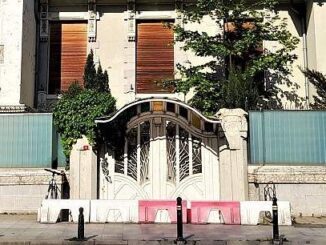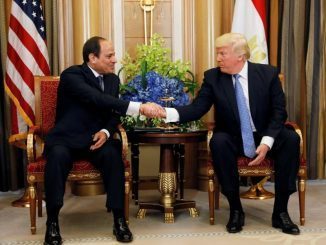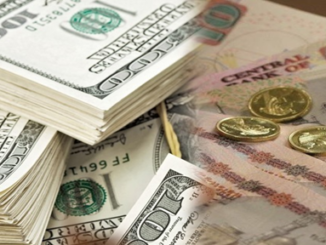
The International Monetary Fund’s executive board has approved Egypt’s request to secure $12 billion loan facility after Egypt met its requirements to implement tough measures to revive its floundering economy, reported the Wall Street Journal. The IMF said that the first tranche of $2.75 billion can be disbursed immediately and will be added to the cash-strapped country’s international reserves.
IMF Managing Director Christine Lagarde said that Egypt in recent months has secured additional financing worth billions of dollars, floated its tightly managed currency and cut fuel subsidies, efforts that received strong support from the IMF.
The approval of the IMF would be seen as an achievement by the Egyptian regime but in reality, it is decision with risky concessions that would have fatal results if it didn’t achieve its goal.
In this context, The Economist said that al-Sisi had no other choice but to bow to the inevitable IMF conditions. In its article titled: “Two Cheers for the General,” The Economist said, “When you have no other options left, you may as well bow to the inevitable,” referring to Abdel Fattah al-Sisi who made a decision to float the Egyptian pound on November 3.
Al-Sisi floated Egypt’s national currency as the budget deficit exceeded 12% of the GDP and the dollar shortage had sharply driven the value of the Egyptian pound to barely half its official price in the back market.
While Egypt was seeking to secure the IMF loan $12bn lifeline, the IMF imposed tough conditions to pour the money to the Egyptian economy. At the end, al-Sisi has fulfilled them, and the IMF money will soon start to flow. “But this must be the beginning, not the end, of his reforms,” said The Economist.
The Egyptian currency is trading now at a market rate of 18 to the dollar; compared to the overvalued rate of about 8.8.
“However, it is still not clear whether this float is genuine. The pound could easily come under renewed pressure, and there is no guarantee that the government will not suspend the float and see the black-market return,” as mentioned by the Economist.
In fact, the external credit-card transactions are still restricted, so the market is not free even now.
In the same context, Egypt has fulfilled the other two main IMF conditions have been fulfilled only up to a point. The parliament passed a long-promised law introducing a value-added tax (VAT) last August.
The other decision was the government’s reduction to the subsidies last week, “with increases of up to 50% in the local-currency price of petrol, after earlier rises in the price of electricity.”
The Economist said that the coming period is critical in Egypt. First, “it is essential that there is no backsliding on the reforms.” The magazine said the economy may start to rebound quickly if reforms continued smoothly and foreign currency revenues returned back.
Tourism and foreign investments which were among the main sources of foreign currency have withdrawn from Egypt due to unrest and instability.
“Since the currency has fallen by half, Egypt is now much more attractive to foreign investors and even to tourists, so long as they are prepared to forget about last year’s Islamic State bomb attack on a plane flying out of Sharm el-Sheikh (not to mention the torture and murder of an Italian researcher),” said The Economist.
Second, the government must not imagine that it has done its work as” Egypt remains a deeply frustrating place to run a company, ranking a woeful 122nd in the World Bank’s ease-of-doing-business index,” said the British magazine.
As the sugar crisis escalated last month in the country, the Egyptian authorities seized thousands of tonnes of “overstocked” sugar from PepsiCo and other local factories which will have negative repercussions. The Economist said that such actions “will hardly have improved the country’s reputation.”
Moreover, the army interference in economy won’t encourage investors as they can’t hardly compete in a market dominated by the military.” The army still interferes in the economy, a habit that has only worsened since Mr. Sisi installed himself in a coup in 2013.”
The armed forces economic activities are “a long-established tradition of crony capitalism, with large incumbent firms favored in myriad ways, from licenses to access to capital, makes it hard for startups to breathe wholesale onslaught on red tape should be Mr. Sisi’s next big target,”
In addition, al-Sisi has been criticized for spending too much public money on grand projects, such as widening the Suez Canal, which have failed to bring the expected revenues.”
In the end, the magazine pointed to the challenge that will be facing al-Sisi to handle the inevitable reaction to his reforms from ordinary Egyptians who are already struggling the poor conditions that hit the country.
“Inflation is already painfully high, at 14% or so, and costlier imported fuel and food will lift prices higher this year,” said the magazine.
As a result, the fear from public dissent would have been the reason that pulled back al-Sisi so long to adopt these policies. Regarding protests, the Economist said that they are likely but al-Sisi “must not meet them by over-reacting with teargas, baton-blows and mass arrests,” adding, “scaling back inefficient subsidies and using the money to make direct cash payments to the poor would be a better approach. It is galling when an undemocratic government asks for sacrifices.”



